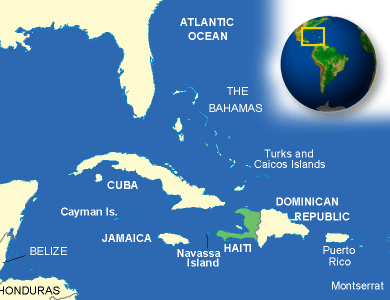
12 Jan 2015 | Focolare Worldwide

It was a tragedy «that caused death, destruction and also desperation» and where «a lot has been done to rebuild the country » but where a lot of work still remains to be done.» This was what Pope Francis said to the participants at the meeting promoted for the 5th anniversary of the 12 January earthquake.
Though part of a very poor society, also the Focolare Movement’s community in Savanette (Mont-Organisé in the North-East) immediately expressed its willingness to receive and help the evacuees arriving from Port-au-Prince, the capital which was immensely devastated. The local association, PACNE (Action Contre la Pauvreté du Nord-Est), thought of creating a centre to host the evacuees and with the contribution of many communities from various parts of the world and the assistance of the AFN associations (Action for New Families) and AMU (Action for a United World), was able to set up the community centre, “Maison de la Providence,” which offered employment and accommodation to evacuee families. On the whole, in its first two years of activities this centre supported about 500 people.
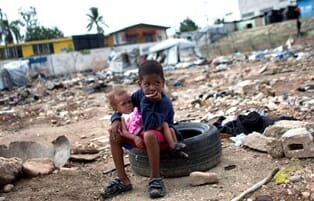
Foto: Dieu Nalio Chery/AP
At Port-au-Prince, two projects were conducted by AMU in close collaboration with the Scalabriniani Missionaries, as a sign of that “ecclesiastical communion” which has characterised the reconstruction of Haiti, in which many ecclesiastics or lay organisations were involved. The first, related to an urbanization plan for families who were without homes, consisted of the creation of a new electric line to service two villages, by which 41 families were able to connect to the electric power grid. Furthermore, to help complete the construction of the “Montebelluna-Bassano” village composed of 27 housing units for the benefit of 135 people, the contribution of AMU went to the laying of the village’s water and sewerage system and the electrical equipment of each house. The power grid was boosted through a production pole with a powerful generator, in such a way that many small enterprises in the area (cement blocks, carpenter workshops, a bakery, an industrial kitchen and a poultry farm) managed to increase their own production. Lastly, AMU supported the start-up of a poultry farm – with job opportunities for 10 people – through the construction of a water reserve tank, indispensable for the water supply of the 3,000 animals and slaughtering activities.
A community centre – school, recreation centre and big sports ground – was the second project AMU supported. Through AMU the Focolare Movement also supported other social activities for the Haiti population: at Carice (always in the North East), for many years a professional nurse was employed in the small clinic of the Sisters of Mary Immaculate, while waiting for one of the religious to complete her specialization and be able to work in the clinic, one of the few healthcare centres at the service of the population. Lastly, with PACNE and the specific contribution of the Youth for United World, a study scholarship program was launched for around ten Haitian youth, to allow them to pursue their university studies in Haiti, and for others to acquire good professional skills in the Dominican Republic close by, to be placed at the disposal of their own country.
Related AMU project: www.amu-it.eu
11 Jan 2015 | Focolare Worldwide
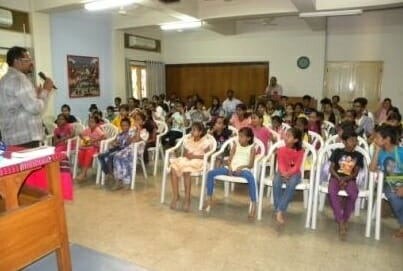
11 Jan 2015 | Focolare Worldwide
 Together with Shanti Ashram, a Hindu movement inspired by teachings of Ghandi, the Udisha movement conducts and supports various activities such as the Piggy Bank, with the motto: The more you give, the more you get.
Together with Shanti Ashram, a Hindu movement inspired by teachings of Ghandi, the Udisha movement conducts and supports various activities such as the Piggy Bank, with the motto: The more you give, the more you get.
“Launched in March 2014, the project draws its inspiration from Chiara Lubich’s concept called the “culture of giving,” and which she held very dear,” one of the coordinators, Valentino Agri, wrote. “The project thus expresses the great desire to share with the children and their families, the discovery of God’s immense love for each one of us.”
The initiative aims at promoting the importance of savings as a way of meeting the needs of the poor. Practically speaking, this is a small personal piggy bank where every child can deposit his/her savings. At the end, the proceeds are divided into two parts: one for those children living below the poverty threshold, the other, for the family of the child who possesses the Piggy Bank.
 “A few months ago, an interactive meeting was held with Mr. Vijay of the Shanto Ashram to discuss the problem of poverty, Valentino says, “which revealed the scenario on the poverty experienced by many children in the villages of India, in circumstances that differ from those of children in the cities. It stressed how our children in Mumbai, despite the daily difficulties of life in the slums, can still consider themselves lucky to have a family, and can go to school. Instead, thousands of minors have no one to take care of them, and often lack food and water, and have no education or healthcare. Mr. Vijay furthermore explained to the children how their own contribution, no matter how small, can make a difference for those who have nothing. “Our country will be a better place for each child if we all share what we can,” he affirmed.”
“A few months ago, an interactive meeting was held with Mr. Vijay of the Shanto Ashram to discuss the problem of poverty, Valentino says, “which revealed the scenario on the poverty experienced by many children in the villages of India, in circumstances that differ from those of children in the cities. It stressed how our children in Mumbai, despite the daily difficulties of life in the slums, can still consider themselves lucky to have a family, and can go to school. Instead, thousands of minors have no one to take care of them, and often lack food and water, and have no education or healthcare. Mr. Vijay furthermore explained to the children how their own contribution, no matter how small, can make a difference for those who have nothing. “Our country will be a better place for each child if we all share what we can,” he affirmed.”
The kids committed themselves even more to keeping their savings in the Piggy Bank: “On Ghandhi’s birthday anniversary,” Valentino continued , “we broke our money box and gathered about 3,000 rupees, equivalent to 45 euro». A small fortune, in that context and considering the fact that we are talking!
“My mum usually buys a cake on my birthday. This time I asked her to give the amount for the cake, and I was able to put it in my piggy bank. I felt happy…”, recounts Alisha, 10 years of age.
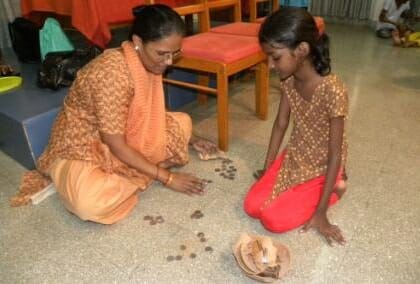 “At times my mum gives me money to take the rickshaw to school, but sometimes I went on foot so I could save and put the money in my piggy bank…”, says Rachael, 11years. While Valerie, who is only 6 said: «My uncle gave me ten rupees to buy some biscuits. He saw that I put it in my Piggy Bank for my brothers and sisters who do not have mothers and fathers and who cannot go to school like me. So he gave me another ten rupees. » At times also a bit of slyness comes in useful. Nine-year-old Ryan narrated his experience: “Like all my friends at school I wanted to buy an expensive pen. I then remembered my Piggy Bank and I bought one that cost 5 rupees less, so no one would think of stealing it!”
“At times my mum gives me money to take the rickshaw to school, but sometimes I went on foot so I could save and put the money in my piggy bank…”, says Rachael, 11years. While Valerie, who is only 6 said: «My uncle gave me ten rupees to buy some biscuits. He saw that I put it in my Piggy Bank for my brothers and sisters who do not have mothers and fathers and who cannot go to school like me. So he gave me another ten rupees. » At times also a bit of slyness comes in useful. Nine-year-old Ryan narrated his experience: “Like all my friends at school I wanted to buy an expensive pen. I then remembered my Piggy Bank and I bought one that cost 5 rupees less, so no one would think of stealing it!”
«It is a small drop in the ocean, but it is a drop just the same – Valentino concluded -. We suggest you propose this initiative also in your environments, so that this drop can become a river!»
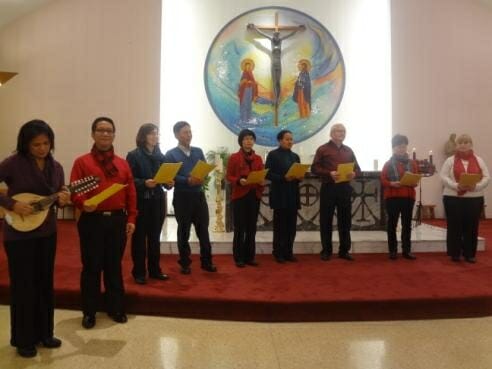
10 Jan 2015 | Focolare Worldwide
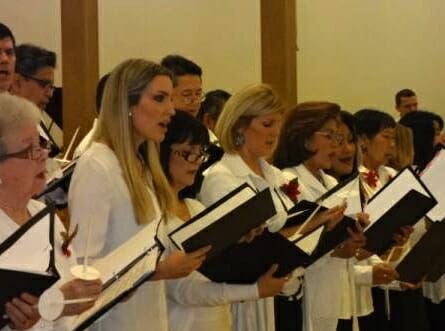 “I am a coordinator for ecumenical and interreligious relations in the Diocese of Vancouver, Canada. In January 2014, the prayer service was planned jointly by the Anglican Diocese, the Evangelical Lutheran Church, the Mennonite Church, the United Church of Candada and the Armenian Apostolic Church. There was a solemn moment for the exchanging of gifts, and everyone felt how much the Churches had to offer. The musical interludes were also gifts to each other. We invited the choirs and cantors from five different traditions to enrich the prayer service with their harmonies. The joy of being together and recognizing the power of common prayer was very tangible, as well as the willingness to open ourselves to each other.” A project was also born from this experience: an ecumenical concert involving choirs from different traditions. The concert included three choirs (Ecumenical Fatima Choir, Armenian Apostolic Church choir and the Focolare choir), as well as a cantor from the United Church of Canada. The Focolare choir offered two songs that described the joy we experience when Jesus is in our midst. The variety of the programme that included both traditional Christmas carols and contemporary music, interspersed between readings from the Second Sunday of Advent, drew people in from many denominations in Vancouver. The service concluded with the lighting of candles as a symbol of carrying Christ into the world. People were very pleased and appreciative of the event, especially the possiblity of gathering members from diverse churches and Christian communities during the Advent season, to give glory to God with hymns from different traditions.
“I am a coordinator for ecumenical and interreligious relations in the Diocese of Vancouver, Canada. In January 2014, the prayer service was planned jointly by the Anglican Diocese, the Evangelical Lutheran Church, the Mennonite Church, the United Church of Candada and the Armenian Apostolic Church. There was a solemn moment for the exchanging of gifts, and everyone felt how much the Churches had to offer. The musical interludes were also gifts to each other. We invited the choirs and cantors from five different traditions to enrich the prayer service with their harmonies. The joy of being together and recognizing the power of common prayer was very tangible, as well as the willingness to open ourselves to each other.” A project was also born from this experience: an ecumenical concert involving choirs from different traditions. The concert included three choirs (Ecumenical Fatima Choir, Armenian Apostolic Church choir and the Focolare choir), as well as a cantor from the United Church of Canada. The Focolare choir offered two songs that described the joy we experience when Jesus is in our midst. The variety of the programme that included both traditional Christmas carols and contemporary music, interspersed between readings from the Second Sunday of Advent, drew people in from many denominations in Vancouver. The service concluded with the lighting of candles as a symbol of carrying Christ into the world. People were very pleased and appreciative of the event, especially the possiblity of gathering members from diverse churches and Christian communities during the Advent season, to give glory to God with hymns from different traditions.  The Advent Ecumenical Service was only one of several events. The Catholic Church in Vancouver will mark the 50th anniversary of the publication of the Decree on Ecumenism, with a conference titled: “Unity of Christians: Have we answered the call?” The conference will be held on January 17 and be one of the events of the Week of Prayer for Christian Unity in Vancouver. Speakers will be from the different Christian Churches; the programme that was prepared and sent to all the Christian communities of the city, has been widely appreciated, and many have said they will attend.” Marjeta (Focolare, Vancouver)
The Advent Ecumenical Service was only one of several events. The Catholic Church in Vancouver will mark the 50th anniversary of the publication of the Decree on Ecumenism, with a conference titled: “Unity of Christians: Have we answered the call?” The conference will be held on January 17 and be one of the events of the Week of Prayer for Christian Unity in Vancouver. Speakers will be from the different Christian Churches; the programme that was prepared and sent to all the Christian communities of the city, has been widely appreciated, and many have said they will attend.” Marjeta (Focolare, Vancouver)

9 Jan 2015 | Focolare Worldwide
 Loving the differences
Loving the differences
One night my husband, Toni, made a joke that just shocked me. I had never realised that he was harbouring inside so many grudges and misunderstandings. I thought: “What? He had all this inside him and never told me?” I was completely downcast. We had tried to have a Christian marriage, and I always admired his transparency, but this time Toni proposed going to his parent’s house for the holiday. Even though the thought was a bit burdensome (since we needed to be alone with one another), I said yes. Nevertheless, we agreed to find as much time as possible for ourselves: to begin over, to regain our communion. So, while my in-laws took care of the children, we went out. I was feeling a bit fearful of what might come out. We went to a nice little place, had something to eat and, first he and then I, opened up in complete honesty. Since that had not happened in such a long time, we both tried to put aside our own point of view, in order to embrace the other. We understood one another and were able to choose one another again, along with those differences that had made us fall in love.
G. P.- Italy
Refugee Camp
I’m Muslim. I come from Afghanistan. I applied for asylum in Holland, for me, my wife and two sons. We lived for nearly three years in a small room at a refugee camp. Once in a while I went to the city to look for friends. It was in vain. We have a saying: “If you want to pray, look for a mosque. If you don’t find a mosque, then go into a church because both are places of prayer.” There was a church beside the market. I went in and came to know a family, through whom we met other Christians. We never felt alone again. Since then we learned to put love into practice, beginning with the refugee camp, a place of misery, problems and wounds. We ourselves were seeing a psychiatrist specialised in war trauma. But after meeting these new friends, we gave up psychotherapy. Because of my work as a writer and translator, I had received an electronic typewriter as a gift, which I then gave away to someone who had been a journalist back home.
G. M. – Holland
Toys
Even though I’m only seven, I can do something so that the world can be more good. For example, when someone gives me some money, I share it with the poor, and my heart feels happy. As I was thinking of the children who don’t even have one toy, I looked through the ones I had; I fixed them well and put them in a box, for them. It’s not so easy to give away your own things, but when I knew how happy they would be, I was happy too. Just as I was about to finish preparing the box, a telephone call arrived from Grandmother: she told me that one of my cousins had left some toys for me, that she was no longer using. I jumped for joy. It was God’s answer to me.
J. E. – Brazil
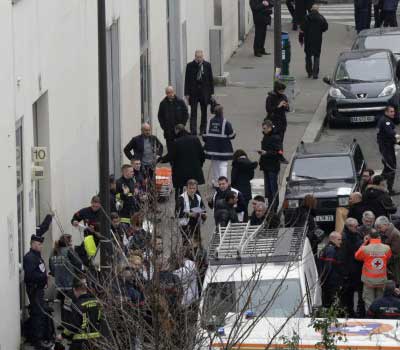
8 Jan 2015 | Focolare Worldwide
 “NetOne, the worldwide association of journalists and communications operators promoted by the Focolare Movement, strongly condemns the despicable attack against the editorial staff of Charlie Hebdo. NetOne expresses its solidarity and closeness to the colleagues, relatives and supporters of the victims. Nothing can justify the senseless killing of journalists because of their job. At the same time we wish that the work of many journalist colleagues and of many communications operators who are already committed in studies, in learning and in the mutual recognition and enhancement of cultures, religions and far off worlds may continue with more effectiveness. Indeed, we wish that it may be supported and encouraged also by public institutions and civil society. The journalists and communications operators who adhere to NetOne are convinced that the way of violence is a dead end. Only a true, respectful and sincere dialogue could avoid the growth of a barbarism without end, while the way of mutual regard and an authentic universal brotherhood should be taken with courage. NetOne commits itself to work in this direction, in the respect of freedom of expression and the conviction of those who work in the media and of the public.”
“NetOne, the worldwide association of journalists and communications operators promoted by the Focolare Movement, strongly condemns the despicable attack against the editorial staff of Charlie Hebdo. NetOne expresses its solidarity and closeness to the colleagues, relatives and supporters of the victims. Nothing can justify the senseless killing of journalists because of their job. At the same time we wish that the work of many journalist colleagues and of many communications operators who are already committed in studies, in learning and in the mutual recognition and enhancement of cultures, religions and far off worlds may continue with more effectiveness. Indeed, we wish that it may be supported and encouraged also by public institutions and civil society. The journalists and communications operators who adhere to NetOne are convinced that the way of violence is a dead end. Only a true, respectful and sincere dialogue could avoid the growth of a barbarism without end, while the way of mutual regard and an authentic universal brotherhood should be taken with courage. NetOne commits itself to work in this direction, in the respect of freedom of expression and the conviction of those who work in the media and of the public.”










